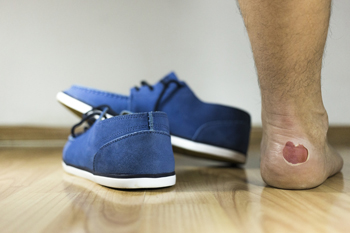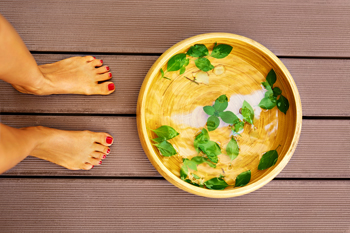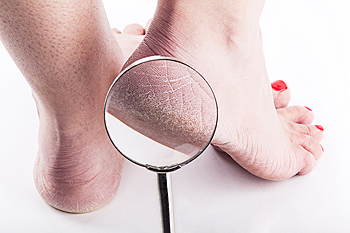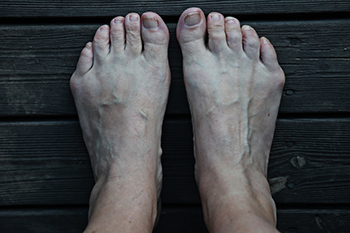Items filtered by date: March 2023
What Can Cause Foot Blisters?

Blisters are a natural defense mechanism the body develops against damaged skin. They are defined as a small area that is filled with liquid over the raw skin, and will gradually drain when new skin has formed. One of the most common causes of blisters is excessive friction, and this can happen from shoes and socks that are worn. Additional reasons why blisters can develop can include an allergic reaction from poison oak, ivy, or sumac, or from medical conditions, such as eczema or autoimmune diseases. It is beneficial to cover foot blisters with a protective pad, and this may be helpful in preventing the blister from draining prematurely. Wearing shoes that fit correctly is often an answer to limit blisters developing on the feet. If you would like more information about the cause and management of foot blisters, it is suggested that you consult a podiatrist who can provide you with the information you are seeking.
Blisters may appear as a single bubble or in a cluster. They can cause a lot of pain and may be filled with pus, blood, or watery serum. If your feet are hurting, contact Deborah Rosenfeld of Rosenfeld Podiatry. Our doctor can provide the care you need to keep you pain-free and on your feet.
Foot Blisters
Foot blisters are often the result of friction. This happens due to the constant rubbing from shoes, which can lead to pain.
What Are Foot Blisters?
A foot blister is a small fluid-filled pocket that forms on the upper-most layer of the skin. Blisters are filled with clear fluid and can lead to blood drainage or pus if the area becomes infected.
Symptoms
(Blister symptoms may vary depending on what is causing them)
- Bubble of skin filled with fluid
- Redness
- Moderate to severe pain
- Itching
Prevention & Treatment
In order to prevent blisters, you should be sure to wear comfortable shoes with socks that cushion your feet and absorb sweat. Breaking a blister open may increase your chances of developing an infection. However, if your blister breaks, you should wash the area with soap and water immediately and then apply a bandage to the affected area. If your blisters cause severe pain it is important that you call your podiatrist right away.
If you have any questions, please feel free to contact our office located in Marlton, NJ . We offer the newest diagnostic and treatment technologies for all your foot care needs.
How to Have Feet That Feel Good

The feet can look and feel their best when everyday foot care is done. Stretching the feet is an excellent way to begin a foot care routine, and there are various foot exercises that can strengthen the feet. It is beneficial to change the socks and shoes soon after a workout, which may help prevent fungus from developing. The feet can be pampered by soaking them in warm water at the end of the day, followed by applying a good moisturizer. Many people choose to wear flip-flops in the warmer months, and it can help to choose a pair that has adequate arch support. Additionally, certain foot conditions, such as ingrown toenails and bunions, may be avoided when shoes fit properly. If you would like additional information about the benefits of practicing everyday foot care, it is suggested that you consult with a podiatrist who can provide you with helpful tips.
Everyday foot care is very important to prevent infection and other foot ailments. If you need your feet checked, contact Deborah Rosenfeld from Rosenfeld Podiatry. Our doctor can provide the care you need to keep you pain-free and on your feet.
Everyday Foot Care
Often, people take care of their bodies, face and hair more so than they do for their feet. But the feet are a very important aspect of our bodies, and one that we should pay more attention to. Without our feet, we would not be able to perform most daily tasks.
It is best to check your feet regularly to make sure there are no new bruises or cuts that you may not have noticed before. For dry feet, moisturizer can easily be a remedy and can be applied as often as necessary to the affected areas. Wearing shoes that fit well can also help you maintain good foot health, as well as making it easier to walk and do daily activities without the stress or pain of ill-fitting shoes, high heels, or even flip flops. Wearing clean socks with closed shoes is important to ensure that sweat and bacteria do not accumulate within the shoe. Clean socks help to prevent Athlete’s foot, fungi problems, bad odors, and can absorb sweat.
If you have any questions please feel free to contact our office located in Marlton, NJ . We offer the newest diagnostic and treatment technologies for all your foot and ankle needs.
Cracked Heels in Men and Women

Cracked heels are a relatively common condition of the foot in which the heels become so severely dehydrated that the skin can essentially crack or form fissures. Fortunately, many different cases of cracked heels are relatively harmless and merely look unsightly. Many newcomers to the field of podiatry often wonder whether cracked heels affect women and men in different ways. The answer is somewhat complicated. Even though about 20% of all adults in the United States have developed cracked heels, women are about 50% more likely than men to report to their medical professional that they have cracked heels. So, therefore, the answer is not straightforward. Just because women are more likely to report cracked heels does not mean that they experience it more than men do. If you are someone that struggles with cracked heels, it is suggested that you contact a podiatrist for treatment or to answer any of your questions.
Cracked heels are unsightly and can cause further damage to your shoes and feet. If you have any concerns, contact Deborah Rosenfeld from Rosenfeld Podiatry. Our doctor can provide the care you need to keep you pain-free and on your feet.
Cracked Heels
Cracked heels appear unappealing and can make it harder for you walk around in sandals. Aside from looking unpleasant, cracked heels can also tear stockings, socks, and wear out your shoes. There are several methods to help restore a cracked heel and prevent further damage.
How Do You Get Them?
Dry skin is the number one culprit in creating cracked heels. Many athletes, walkers, joggers, and even swimmers suffer from cracked heels. Age and skin oil production play a role to getting cracked heels as well.
Promote Healing
Over the counter medicines can help, especially for those that need instant relief or who suffer from chronic dry feet.
Wear Socks – Wearing socks with medicated creams helps lock in moisture.
Moisturizers – Applying both day and night will help alleviate dryness which causes cracking.
Pumice Stones – These exfoliate and remove dead skin, which allows for smoother moisturizer application and better absorption into the skin.
Change in Diet
Eating healthy with a well-balanced diet will give the skin a fresh and radiant look. Your body responds to the kinds of food you ingest. Omega-3 fatty acids and zinc supplements can also revitalize skin tissue.
Most importantly, seek professional help if unsure how to proceed in treating cracked heels. A podiatrist will help you with any questions or information needed.
If you have any questions, please feel free to contact our office located in Marlton, NJ . We offer the newest diagnostic and treatment technologies for all your foot care needs.
A Bunionette Is Known as a Tailor’s Bunion

A small bunion that forms on the side of the pinky toe is called a bunionette. Many people refer to this as a tailor’s bunion, and it occurs when the bottom bone on the pinky toe shifts or becomes larger. This name originated hundreds of years ago when tailors would work with their legs crossed, causing the pinky toes to touch the ground. This would cause a small bump to form on the base of the little toe. It often rubs against the shoe, causing pain and discomfort. A common reason for a tailor’s bunion to develop is from wearing shoes that do not fit correctly. Additionally, loose ligaments, tight calf muscles, or a foot that leans to the outside may be causes for a tailor’s bunion to form. Temporary relief may come from choosing shoes with adequate room in the toe area and wearing a protective pad over the bunion. If you have this condition, it is suggested that you confer with a podiatrist who can provide you with permanent relief, which may include minor surgery for removal.
If you are suffering from bunion pain, contact Deborah Rosenfeld of Rosenfeld Podiatry. Our doctor can provide the care you need to keep you pain-free and on your feet.
What Is a Bunion?
Bunions are painful bony bumps that usually develop on the inside of the foot at the joint of the big toe. As the deformity increases over time, it may become painful to walk and wear shoes. Women are more likely to exacerbate existing bunions since they often wear tight, narrow shoes that shift their toes together. Bunion pain can be relieved by wearing wider shoes with enough room for the toes.
Causes
- Genetics – some people inherit feet that are more prone to bunion development
- Inflammatory Conditions - rheumatoid arthritis and polio may cause bunion development
Symptoms
- Redness and inflammation
- Pain and tenderness
- Callus or corns on the bump
- Restricted motion in the big toe
In order to diagnose your bunion, your podiatrist may ask about your medical history, symptoms, and general health. Your doctor might also order an x-ray to take a closer look at your feet. Nonsurgical treatment options include orthotics, padding, icing, changes in footwear, and medication. If nonsurgical treatments don’t alleviate your bunion pain, surgery may be necessary.
If you have any questions, please feel free to contact our office located in Marlton, NJ . We offer the newest diagnostic and treatment technologies for all your foot care needs.


